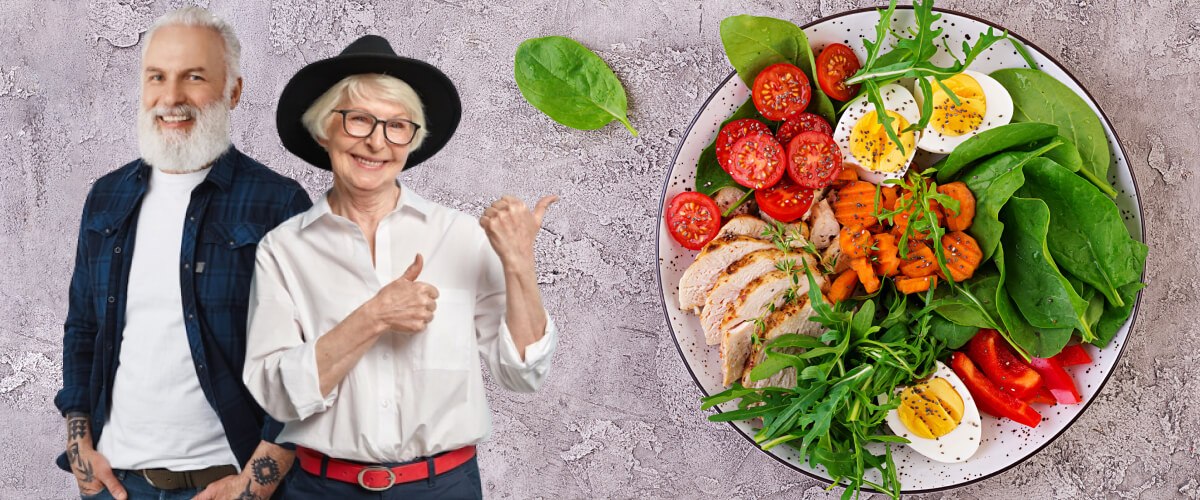Seniors, in particular, need to pay extra attention to their nutritional intake to support their overall well-being and prevent age-related health issues. In this article, we will explore some valuable healthy eating tips for seniors to ensure they receive the essential nutrients their bodies require.
Table of Contents
Toggle11 Healthy Eating Tips for Seniors
As we grow older, our bodies undergo various changes, including a decreased metabolic rate, changes in taste and appetite, and a higher risk of chronic diseases. By adopting healthy eating habits, seniors can enhance their vitality, strengthen their immune systems, and promote overall well-being.
1. Prioritize a Balanced Diet:
Maintaining a balanced diet is crucial for seniors to obtain the necessary nutrients. It involves consuming a variety of foods from different food groups in appropriate proportions. A balanced diet typically consists of whole grains, fruits, vegetables, lean proteins, dairy or dairy alternatives, and healthy fats.
2. Include a Variety of Fruits and Vegetables:
Fruits and vegetables are rich in vitamins, minerals, and dietary fiber. They provide essential antioxidants that help combat oxidative stress and reduce the risk of chronic diseases. Seniors should aim to incorporate a colorful array of fruits and vegetables into their daily meals. These can include berries, leafy greens, citrus fruits, cruciferous vegetables, and more.
Read More: 6 Delicious, Healthy Plant-Based Snacks for Seniors
3. Choose Whole Grains over Refined Grains:
Whole grains such as brown rice, whole wheat bread, and quinoa are superior to refined grains due to their higher fiber content and lower glycemic index. Fiber aids digestion promotes bowel regularity, and helps manage weight. It is advisable for seniors to replace refined grains with whole grains to enhance their nutrient intake.
4. Incorporate Lean Protein Sources:
Protein is essential for maintaining muscle mass, supporting immune function, and promoting tissue repair. Seniors should choose lean protein sources such as skinless poultry, fish, legumes, tofu, and low-fat dairy products. These options provide adequate protein while minimizing saturated fat intake.

5. Monitor Portion Sizes:
Controlling portion sizes is vital to prevent overeating and maintain a healthy weight. As metabolism naturally slows down with age, it is essential for seniors to be mindful of their portion sizes. Using smaller plates, measuring food portions, and paying attention to hunger and fullness cues can help regulate portion sizes effectively.
Get Specialized Live-in Home Care
6. Stay Hydrated:
Proper hydration is essential for seniors as it supports various bodily functions, including digestion, circulation, and temperature regulation. Dehydration can lead to fatigue, dizziness, and confusion. Seniors should aim to drink an adequate amount of water throughout the day and consume hydrating foods such as soups, fruits, and vegetables.
7. Limit Sodium and Added Sugars:
Excessive sodium and added sugars in the diet can contribute to high blood pressure in the elderly, heart disease, and other health problems. Seniors should be mindful of their sodium intake by choosing low-sodium options and reducing the use of salt in cooking. Additionally, they should limit their consumption of sugary beverages, sweets, and processed snacks.
Read More: 10 Best Sugar-Free Snacks for Seniors
8. Consider Nutritional Supplements:
In some cases, seniors may require nutritional supplements to ensure they meet their daily nutrient needs. However, it is essential to consult with a healthcare professional before starting any supplementation. They can assess individual nutritional requirements and recommend suitable supplements if necessary.

9. Mindful Eating and Listening to Your Body:
Practicing mindful eating involves paying attention to the eating experience, savoring each bite, and recognizing hunger and fullness cues. By eating slowly and mindfully, seniors can enjoy their meals more fully, prevent overeating, and improve digestion. It is important to listen to the body’s signals and eat until comfortably satisfied.
Read More: How to Prevent Obesity in Old Age?
10. Engage in Regular Physical Activity:
Alongside a healthy diet, regular physical activity is crucial for seniors to maintain strength, flexibility, and cardiovascular health. Engaging in activities such as walking, swimming, yoga, or tai chi can improve overall well-being and help manage weight. It is advisable to consult with a healthcare professional before starting any new exercise regimen.
11. Consult with a Healthcare Professional:
Seniors should regularly consult with a healthcare professional, such as a doctor or registered dietitian, for personalized dietary advice. They can assess individual health conditions, identify any nutrient deficiencies, and provide tailored recommendations to meet specific nutritional needs.
Conclusion:
By implementing these healthy eating tips, seniors can improve their eating habits, enhance their nutrient intake, and support their overall health and well-being. A balanced diet, rich in fruits, vegetables, whole grains, lean proteins, and adequate hydration, can make a significant difference in maintaining a healthy and fulfilling lifestyle as we age.
Want to Learn More?
ConsidraCare’s caregivers for seniors are trained to offer professional support and companionship to seniors. Please reach out to us at wecare@considracare.com or call us at 1-855-410-7971.
FAQ’s
1. What are the healthy meal tips for the elderly?
Some healthy meal tips for the elderly include:
- Prioritize nutrient-rich foods: Focus on incorporating a variety of fruits, vegetables, whole grains, lean proteins, and healthy fats into meals.
- Adequate hydration: Drink enough fluids throughout the day, including water and other beverages like herbal tea or low-sodium broth.
- Portion control: Be mindful of portion sizes to avoid overeating. Use smaller plates and bowls to help with portion control.
- Limit processed foods: Minimize the consumption of processed and packaged foods that are often high in unhealthy fats, sodium, and added sugars.
- Choose healthier cooking methods: Opt for baking, grilling, steaming, or sautéing instead of frying. This helps reduce the intake of excess fats.
- Include sources of lean protein: Incorporate protein sources like poultry, fish, legumes, eggs, and tofu into meals. Protein is important for maintaining muscle mass and overall health.
2. What are food choices for seniors?
Food choices for seniors should focus on nutrient-dense options that provide essential vitamins, minerals, and fiber. Some examples include:
- Fruits and vegetables: Choose a variety of colorful fruits and vegetables to obtain a range of nutrients. Fresh, frozen, or canned options without added sugars are all good choices.
- Whole grains: Opt for whole grain products like whole wheat bread, brown rice, quinoa, and whole grain cereals for added fiber and nutrients.
- Lean proteins: Include lean sources of protein such as skinless poultry, fish, beans, lentils, tofu, and low-fat dairy products like yogurt or cottage cheese.
- Healthy fats: Choose sources of healthy fats like avocados, nuts, seeds, olive oil, and fatty fish (e.g., salmon) to support heart health.
- Low-fat dairy: Select low-fat or fat-free dairy products such as milk, yogurt, and cheese to meet calcium and vitamin D needs.
- Hydration: Adequate hydration is important, so choose water, herbal tea, and other low-sugar beverages.
3. What nutrition is essential for the elderly?
Several key nutrients are essential for the elderly:
- Calcium and vitamin D: These nutrients support bone health and can be obtained from dairy products, leafy greens, fortified cereals, and sunlight exposure.
- Vitamin B12: Found in animal products, fortified foods, or supplements, vitamin B12 is important for nerve function and red blood cell production.
- Fiber: Adequate fiber intake helps maintain digestive health and can be obtained from fruits, vegetables, whole grains, legumes, and nuts.
- Omega-3 fatty acids: Found in fatty fish like salmon, trout, and sardines, as well as flaxseeds and walnuts, omega-3 fatty acids promote heart health.
- Potassium: Foods like bananas, oranges, potatoes, spinach, and tomatoes are good sources of potassium, which is important for heart and muscle function.
4. What is the best breakfast for seniors?
A balanced breakfast for seniors should include a combination of protein, whole grains, and fruits or vegetables. Here are some ideas:
- Oatmeal topped with berries and a sprinkle of nuts or seeds.
- Whole grain toast with avocado and a boiled egg.
- Greek yogurt with sliced fruits and a drizzle of honey.
- Vegetable omelet with whole-grain toast.
- Smoothie made with low-fat milk or yogurt, spinach, berries, and a tablespoon of nut butter.
5. How much should a senior eat?
The caloric needs of seniors vary depending on factors such as age, sex, activity level, and overall health. However, as a general guideline, the average sedentary senior may require around 1,600 to 2,200 calories per day. It’s important for seniors to focus on the quality of their diet rather than just the quantity. Consulting with a healthcare professional or a registered dietitian can provide personalized recommendations based on an individual’s specific needs and health goals.
Maryam is a leading writer at ConsidraCare, specializing in senior care. Her well-researched articles are widely recognized for guiding families through the complexities of caring for loved ones, establishing her as a trusted and authoritative voice in the field.


